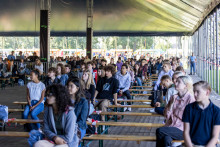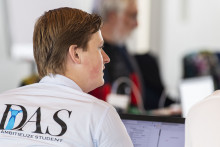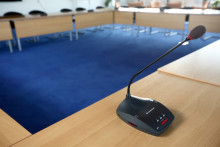Last week, our very own University of Twente was ranked the Best Technical University of the Netherlands. The UT came in third best overall in the ‘Keuzegids Universiteiten 2018’, with many studies ranking highest in the country. As student representatives in the University Council, it makes us proud to see that the incredible efforts made by UT staff and active students have not gone unnoticed by our students. However, news also reached us that the promised language policy is delayed and that our rector trivializes the language problem. Our call to rector Thom Palstra, the rector: ‘Come on, let’s take the next step and work with us to increase student satisfaction and the quality of our education’.
The University of Twente scored a 6,3 for its English education, in the latest Keuzegids. This reflects many students’ satisfaction with the level of English among their lecturers; these people deserve praise for their hard work and flexibility in adapting to a new language. However, the Keuzegids also indicates that the English level at the UT is below the national average.
About the authors: UReka
This piece has been written by the current faction of the University Council party UReka. We are the student party actively pursuing representation of all students and we have been working hard to voice student concerns to the Executive Board. The topic of English has been going on for quite a while. The Board promised to offer a language policy this December but delayed its publication. When the Keuzegids emphasized the importance of this topic, we decided to write this article to show the work that already has been done, and to highlight our determination to solve it. What do you think? Let us know by sending an e-mail to [email protected]
The student perspective
UReka has received complaints from many students who feel that the level of English is below par. According to the University, the switch to English was made to increase the quality of our education. Although lecturers put effort into their teaching, students have repeatedly experienced lecturers who struggle to find words, are hard to follow and make incomprehensible exam questions. Furthermore, many lecturers lose their wit and humour when not using their mother tongue, which makes lectures less inspiring.
'We are behind schedule and need to put in the effort to catch up!'
In regular meetings with the study associations and Overleg Studieverenigingen (the umbrella of study associations), we see the hard work of study association in the process of internationalization. In meetings like ICOS (Internationalization Committee OS), they share their best practices regarding internationalization. The study associations mention their concerns about the quality of education with regard to the language switch during the monthly Overleg Onderwijs Commissarissen (Meeting of Educational Affairs, OOC). While the associations are doing a great job at internationalizing, they need more support.
Supporting teachers
Luckily, approaches to help improve the level of English already exist. The TCP Language Centre of the UT identified the problem a while ago. According to Katja Hunfeld, the Head of the Language Centre ‘It is one thing to have an overall high level of English and another thing to actually teach in English’. That is why they have prepared a course ‘English as a means of instruction’, to help teachers who are struggling with the transition. Unfortunately, even though Hunfeld has these courses ready, the Executive Board has not sought contact yet with the Language Centre.
'Teachers have been thrown in at the deep end'
It is not only the policymakers that have trouble finding the Language Centre. Although teachers feel the necessity to follow the course and want to further develop themselves, few teachers follow the course since they are often obstructed by high workloads.
Teachers have been thrown in at the deep end, students have seen the quality of their education stagger, and, while help is available, the Board has not assisted sufficiently. Our University has made the switch to an international campus, but no language policy has been published, instead, it has been postponed. We are behind schedule and need to put in the effort to catch up!
Internationalization: a national topic
This problem is more widespread than just our university. Yesterday, Pieter Duisenberg, the chairman of the VSNU (association of Dutch universities), visited our university. He had a lunch discussion with some employees and students (among whom someone from our faction), in which internationalisation was an important topic. The VSNU has set up two main goals for the coming year: one of them is to make the Dutch universities belong to the international top. To make this happen it is important to make sure everyone can understand the lecturers and follow our high quality education.
Furthermore, UReka is in contact with many other student councils at other Dutch universities. During the meetings with other councils internationalization is also a hot topic. We want to use these contacts to help the UT, by sharing best practices with the Executive Board and the Language Centre.
UReka will continue to bring this topic forward. We will collaborate with study associations, learn from other university councils, and engage in a discussion to increase the quality of education. We are grateful for the continued effort our teachers put into our education, and want them to get the support they need if they struggle with the transition to English. There is no need for the switch to English to have a negative impact on the quality of education. We need to act now to ensure that students get the best education possible and that our University of Twente will rank number one next year. Thom, are you up to the challenge?







